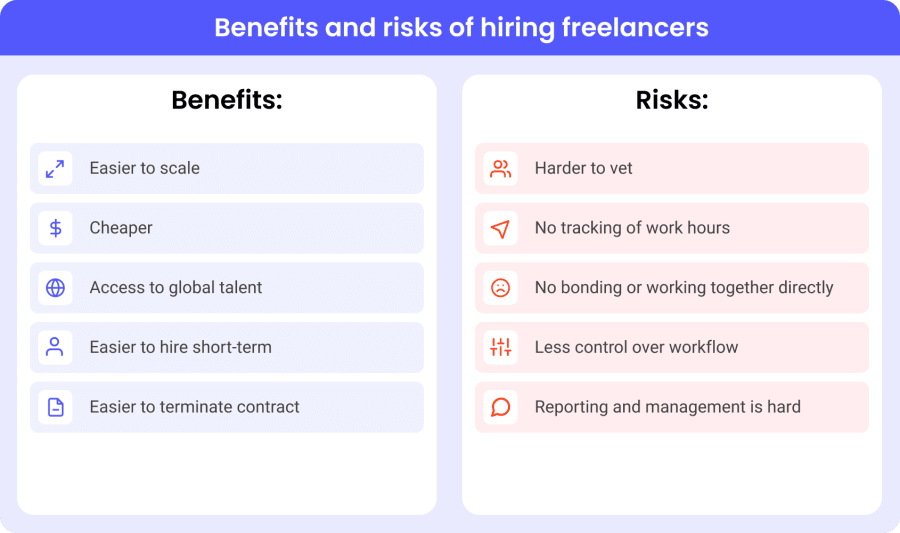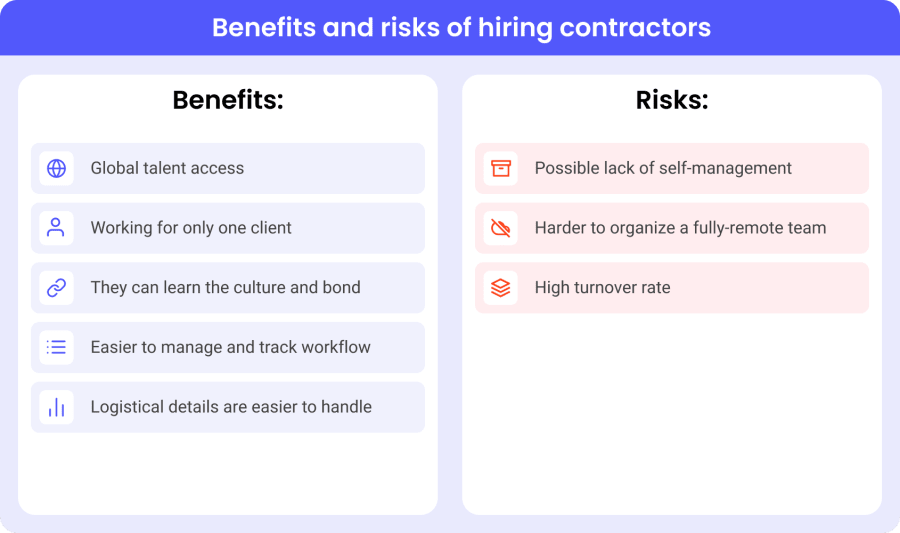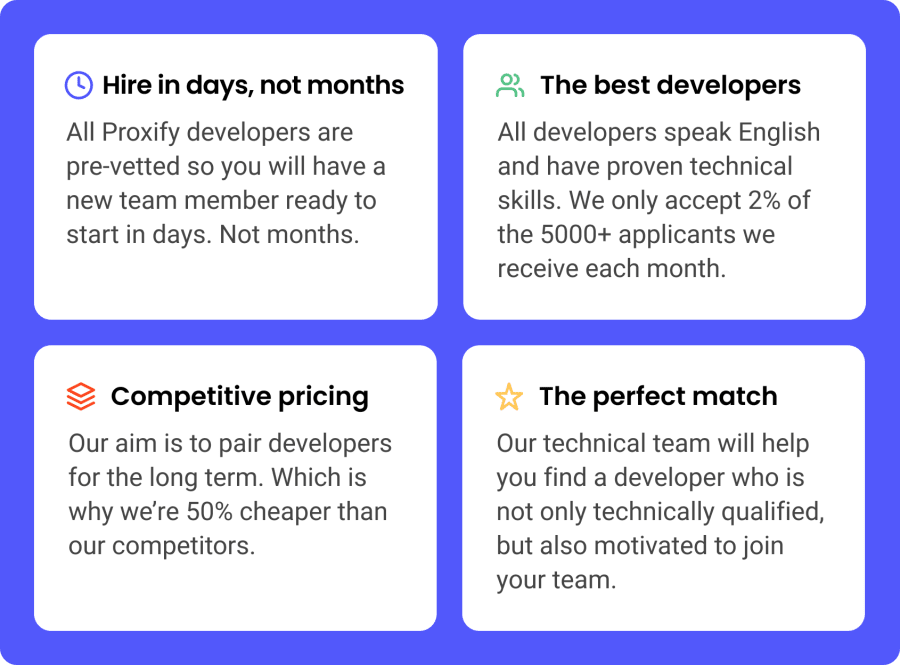With the gig economy constantly growing and more and more people ditching the 9-to-5 life to take full control of their work hours and projects, it is possible to find an amazing developer quickly nowadays without having to hire an employee full-time.
Although freelancers and contractors are often more affordable, full-time employees and easier to find for a short-term engagement, it isn’t always easy to ensure their quality, knowledge, professionalism and how much they actually work on what you hired them to do.
In this article, I’ll explain the pros and cons of working with freelancers, contractors, and finally, I’ll also delve into what it’s like to hire tech experts through Proxify.
Hiring freelancers
For companies that are scaling up quickly, have limited-time engagagements that require developers or simply cannot handle the workload they need to delegate to their in-house full-time developers, hiring freelancers can prove to be very useful.
There are millions of people working on freelancing platforms, some of them with more than a decade of experience and expertise in highly-required tech stacks and skills.
Yet, it can sometimes be tricky. It is harder to vet freelancers, and juggling multiple outsourced professionals can take a lot of time and energy. But are the pros greater than the cons? Let’s find out.

Benefits
Here are some of the main benefits of hiring freelance developers:
Great for scaling up
Freelancers usually take less time to source, hire and onboard, so if you need someone to quickly join your team or help on a short-term engagement without any strings attached, it is the best option.
Helps with cutting costs
Sometimes, lower rates mean lesser quality or getting a freelancer with limited experience. But that’s not always the case. Given that some freelancers come from countries with lower average salaries in the field, they leverage this to their advantage and beat their counterparts from more expensive countries by charging less.
Gives access to global talent
Connected to the cutting costs, freelancing platforms open a gate to the global talent pool, where you can cherry-pick the best — even for a lower price because of their background, country of origin and other factors.
Easier to hire short-term
It is almost impossible to make someone coming from a traditional employment model to work on a short-term engagement. People looking for long-term employment wouldn’t accept to be secured with a salary, health insurance and other benefits only for a couple of months.
Easier to terminate contract
With freelance employment, there is an underlying no-strings-attached policy that exists outside the rules of the temporary contract done through a freelancing platform.
Risks
We all know there are two sides to every coin, so hiring freelance employees comes with certain risks as well. Here are the most notable ones.
Harder to vet freelancers
As a business owner or recruiter, you probably have the quality and professionalism of your possible candidates put as the top priority. Taking that into consideration, vetting freelancers is extremely important. And it isn’t always exactly easy to do.
The good news is that most freelancing platforms have a rating system that is quite transparent, making it easy to see which candidates have a star record from previous clients. However – as with anything on the internet – there are loopholes and ways to build up your reputation with fake reviews or to simply update a pre-existing portfolio from a freelancer that doesn’t use it anymore.
So it is quite risky to try and review the work of freelancers on your own, especially if they charge by the hour.
Harder to track work hours
Once again, some freelancing platforms have useful time-tracking tools, but they are only applicable if the freelancer agrees on using them. In the gig industry, flexibility is one of the driving forces that brings so many people to make the decision to work freelance. So, micromanagement would not be smart to do if you are considering this way of sourcing your employees.
However, if you still prefer having a clear schedule of what your freelancer is working on, then time tracking might be a challenge.
Working with a company for a limited period and on a limited engagement gives you a different point of view. You don’t really try to bond with the people you work with, you don’t invest yourself in the company culture, and you can’t really connect with the product or service.
If you want long-term employees that fully understand and appreciate your company and its products and services, hiring freelancers might not be preferable for you.
Less control over the workflow and deadlines
If freelancers work with multiple clients and they juggle a lot of different tasks, the notions of being late or delivering engagements after work hours also might happen a lot. As I previously mentioned, micromanaging is not all that appreciated when working with freelance developers, but the inability to have control of where your task will be completed isn’t all that great either.
Reporting and management are hard
Managing multiple freelancers, their workflow, time of delivery, payouts and other details can be a nuisance. Of course, most platforms allow enterprise packages that include taking care of salaries, taxes, scheduling and similar logistical details that come with hiring freelancers. But, they also come at a much steeper cost.
So, you would need to conduct a cost/benefit analysis to see if that is even more affordable than having in-house employees.
Should you work with a freelancer?
If you need developers for a short-term engagement or need to scale up quickly on a temporary basis, then freelancers are the best people for the job.
However, keep in mind that you will need to work with vetted freelancers with a good portfolio on a trusted platform that you can easily review – and also take care of some extra tasks around reporting, management and communication.
The CTO's guide to different hiring models
How to hire for a fast-growing tech company
Hiring contractors
Contractors are very similar to freelancers, in the sense that they work remotely, pay their own taxes and benefits, and can come from any country or time zone.
However, the main difference is that contractors work with one company, instead of juggling multiple clients at a time. To explain it simply, contractors are full-time employees, but they come without the extra costs of benefits and taxes paid by your company.
Contractors are usually very skilled and professional, and most of the time work with international companies that meet their salary requirements and objectives as well.
They are the ideal candidates for a fully-remote company, startup or simply a team that can outsource employees from a different country and can pay them enough for them to be able to cover their own benefits and taxes.
Here’s the rundown.

Benefits
As with most things, the realistic situation of hiring contractors depends on the company, the budget and the engagement itself. Here are some pros that apply generally.
Access to global talent
Similar to hiring freelancers, you can hire contractors from all over the world. Depending on the tech stack and language prerequisites, you can probably find expert talent from anywhere as long as it fits their salary requirements and ability to work in your time zone.
Devoted only to your company and engagements
Unlike freelancers, contractors don’t work with multiple clients and can be focused only on your engagements and tasks. This allows them to learn the service or product better, but also to communicate more effectively and make sure the workflow is smooth and timely.
Likely to learn the culture, product and bond with the people
Showing up at the same job every day – even virtually – means that your contractor will frequently communicate with you, work with other people involved in the engagement, and start bonding with colleagues while also taking part in sharing the company culture.
If you want someone to stay with you in the long term, this is extremely significant.
Easier to manage and track work hours
This varies from company to company, but most workplaces, even if remote, have designated work hours when the contractor is expected to work and to be available for meetings.
Whether you encourage using a time tracking system or simply care about the contractor being responsive during the same time intervals as yourself, it is more likely to expect this kind of behavior from a contractor that works for you full time, rather than a freelance contractor.
Salaries and reporting are easier to take care of
Another good thing about freelancers is that you only need to sign a contract with them once, take their information to be able to pay them out, and then set a system to do this on a monthly basis.
Risks
Who says there are only ups? Here are the risks of working with a contractor.
Might not be able to self-manage
Since contractors work remotely and you don’t have an overview of their daily routines, they might be lagging behind or having a hard time meeting deadlines.
This generally depends on the person and if they have previous experience working remotely, but the inability to self-organize can be a real deal-breaker in the person you are considering for long-term employment.
Harder to organize a fully remote team
Organizing an entire team of remote contractors can prove to be very difficult.
Not only do you need to plan and track a workflow for everyone, but you also need a channel where everyone can communicate effectively and transparently, a task board, a knowledge base of standards of practice, a cloud or mutual storage for files, etc.
On top of that, a remote team is less likely to share a culture or build a rapport the same way people working in an office together every day often do. So, in a way, this adds to the risk of not being in sync.
More likely to leave for a better opportunity
As most of us know, the turnover rate in the software engineering industry is quite high. And when you add to that the fact that contractors don’t have benefits and are competing on a global market, the chances that they’ll leave your company if a better opportunity arises become even higher.
And it is different from ending a collaboration with a part-time freelancer. You still expect the contractor to continue working for you for a longer period of time, so it takes a lot longer to find and onboard a new person for the job.
Should you work with a contractor?
If your company works in an international language and wants to cut costs by hiring contractors from low-income countries for much better compensation than one they’d make in their respective countries, then working with contractors would be an ideal way to solve your hiring problems.
You get the perks of having a full-time employee without having to cover their benefits and taxes, and you can even operate fully remotely without having an office.
However, organizing and nurturing a remote culture can be challenging, so it is reasonable to expect a high turnover rate.
Why Proxify developers are better than freelancers or contractors?
So, now that we’ve covered the differences between hiring a freelancer and a contractor, let’s also examine what it’s like to work with our company.
Proxify boasts more than 1000 developers that are experts in their tech stack, sometimes coming from niche industries. We feature engineers from all over the world, and we match them based on a number of factors with the perfect company for them.
These are the biggest perks of hiring with Proxify.

More affordable than traditional employment or hiring an agency
With Profixy, the cost per hour (depending on the stack and level of the developer), are considerably less than using agencies. The hourly cost of developers sourced through an agency can get up to 150 euros. Traditional employment can be even more expensive, depending on the country, the cost of employee benefits and the cost of taxes.
No recruitment cost at all
The cost of sourcing, interviewing, advertising and onboarding developers in traditional employment can be overwhelmingly expensive in the long run. With our service, you just pay developers by the hour, and everything else is handled by our professional team of recruiters, community managers and interviewers.
You can hire in days
Working with a rich and professional workforce makes it possible for our team to provide the perfect match with the right developers for your needs in as little as a day or two on average. They can start working immediately, while you can save months that you would have otherwise spent looking for talent to hire in-house or working with an agency.
Our developers are quality assured
We cherry-pick our developers and accept only the best 2% of a monthly average of more than 5000 applications. All the developers are vetted, speak English and have proven technical skills.
We don’t charge termination costs
If you are unhappy with your developer, we’d be happy to match you with someone else from our company. And if that doesn’t do the trick, we charge no cancellation costs!
To learn more about our company – check our glossary of technologies.








